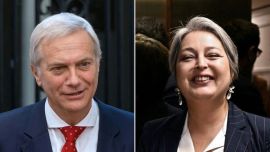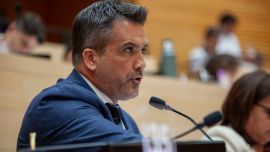Argentina's nationwide lockdown to tackle the spread of the novel Covid-19 coronavirus will be extended by the government beyond the current May 10 expiration date, though restrictions will continue to be lifted in some provinces.
Sources inside the government, in briefings to local media outlets, have said that they expect President Alberto Fernández to extend the lockdown before this coming Sunday, when it is set to expire. However, specific restrictions may be lifted, according to "geographic segmentation," sources told Perfil on Tuesday.
In the City of Buenos Aires and its surroundings, the compulsory social isolation period will continue as before, with some new economic activities allowed and more restrictions imposed, such as the use of masks in public spaces. Similar measures will apply in the well-populated cities in the provinces of Córdoba, Santa Fe, Chaco, and Río Negro, sources told the newspaper. In the rest of the country, a progressive opening up of the economy will be introduced, according to the epidemiological results of each region, as President Alberto Fernández anticipated in his last message to the nation from the Olivos presidential residence.
The extension has been hinted at heavily by front-line officials in recent public statements.
"The quarantine will continue. It will extend in different ways, according to the country's geography," Health Minister Ginés González García told Perfil over the weekend.
"A province that has no cases is not the same as one that has community circulation. The measures we must have are not the same in each of those places," he said.
González García emphasised that "large cities are in great danger” from Covid-19 because “those cities already have a higher degree of circulation [of people] than they did when the quarantine began. In any case, everything will have to be done slowly and with a foot always on the brake.”
Along the same lines, Chief of Staff Santiago Cafiero said this week that the government had "to take into account that goals must be met to continue slowing down the virus."
He continued: "When we started social isolation we counted the number of days that the virus took to double. At first it was three days, then it was 10 days and last Sunday we had 17 days. When we reach a time where cases are doubling every 25 days, we start phase four.”
At that time, Cafiero explained, "we are going to have the resumption of many activities.”
On Wednesday night, the La Nación newspaper reported that a group of health experts had spoken to González García by videoconference and had agreed that the progress of the virus in Argentina had been slowed enough to allow the loosening of some existing restrictions. The specialists also recommended the president approve "recreational outings" for children, allowing them to go outside for a short period each day.
President Fernández has a conference call scheduled with provincial governors on Thursday, during which the lockdown's potential extension will be discussed.
Different measures by province
Restrictions are likely to differ from region to region, with Buenos Aires City and Province likely to continue facing strict measures. That's a response to data indicating that more than 70 percent of all Covid-19 infections have been registered in the capital and the nation's most-populous district. If the provinces of Chaco, Córdoba, Neuquén, Río Negro, Santa Fe and Tierra del Fuego are added to the tally, that figure rises to more than 92 percent.
In Greater Buenos Aires, City Mayor Horacio Rodríguez Larreta, Buenos Aires Province Governor Axel Kicillof and Transport Minister Mario Meoni are preparing coordinated measures to minimise crowds on public transport. Exclusive roads for motorcycles and bicycles will be offered, along with a "free offer" of combis that enter and leave the suburbs with fixed stops, according to La Nación.
The rest of the country is divided into provinces that have not registered coronavirus cases (Catamarca and Formosa), those that have had few and isolated cases (Chubut, Santiago del Estero and Misiones add up to 30 infections in total since the start of the pandemic) and those that have witnessed controlled outbreaks (Corrientes, Entre Ríos, La Rioja, Mendoza, Santa Cruz and Tucumán, accumulating 300 cases in total). In these districts, quarantine restrictions may be lifted progressively, Perfil reported, with the authorisation of the national government and only when the number of cases is not doubling every 25 days. Among the most successful quarantine examples to date has been Jujuy Province, which will reopen restaurants and shopping malls from this Monday after more than a month without recording new infections.
Meanwhile, Sante Fe Province will also begin easing restrictions from this Wednesday, May 6, with the gradual authorisation of wholesale and retail trade, private commercial works of up to five workers, hairdressers, and nail salons, among other various activities.
Córdoba has also begun lifting quarantine measures in parts of the province. The Emergency Operations Center (COE Central) enabled private work and professional activity in 23 municipalities.
With economic activity and commercial sales in free fall, the government knows that they cannot extend the quarantine without maintaining and extending existing financial assistance measures. President Fernández is expected to announce such a move concurrently with an extension of the lockdown.
-TIMES/PERFIL



















Comments